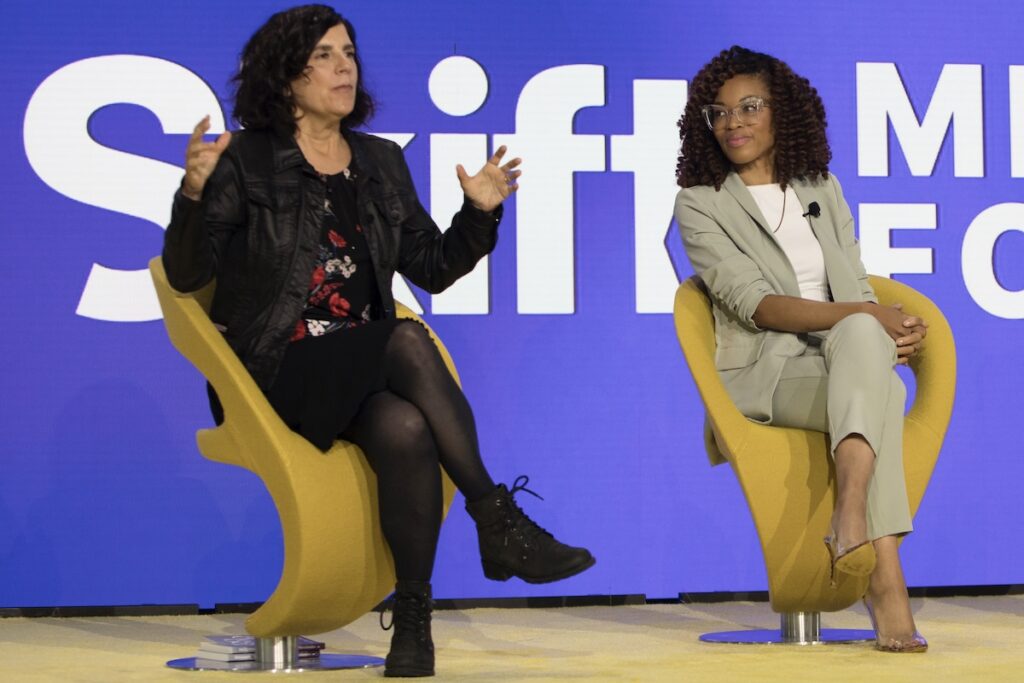
From changing terminology to debates over the effectiveness of employee resource groups, diversity, equity and inclusion (DEI) is a hot topic. Dr. Brandi Baldwin, organizational and leadership psychologist and CEO of Millennial Ventures, speaks with social purpose consultant Bea Boccalandro at Skift Conference Forum to highlight the need for more authentic, values-driven inclusion Effort, not superficiality or haste.
“I don’t have a problem with the word DEI because, frankly, it has become a dirty word that triggers some people depending on who hears it,” Baldwin said. “The values behind DEI are important and it’s all about building a positive company.”
The terminology used has also changed. For example, Destinations International (DI) has abandoned its diversity, equity and inclusion initiatives in favor of so-called “social inclusion.”
Sophia Hyder Hock was hired as DI’s first chief diversity officer in 2022 and currently serves as DI’s chief inclusion officer. “The changes we made were very intentional,” Heidehock said. “This will help our destinations advance their DEI initiatives in a proactive rather than weaponized manner. For us, social inclusion is looking at systemic barriers for underrepresented populations and then figuring out what we can do about it. something to create more inclusivity.
Heidehock said the change caused some confusion at first. “Are we downplaying or diluting DEI? We take the time to have conversations, listen to feedback, and respond by saying absolutely no, and we make sure we take a proactive, inclusive approach.
Visit Florida made headlines in August when it removed its LGBTQ tourism page from its website. The move is hurting already strained relations with the LGBTQ community.
Reversing the trend of limiting DEI efforts
After the death of George Floyd in 2020, many organizations set up DEI departments or hired experts. Baldwin warned against rushing. “I say, ‘Don’t do this, don’t do anything.’ I’d rather you do nothing than move quickly in the wrong direction.
Boccalandro emphasized the DEI field’s infancy. When asked whether companies need DEI departments, she argued that a company’s structure does not necessarily reflect its commitment to DEI. “I don’t know if we need a department, because if we don’t diversify our teams, if we don’t diversify our event stages, if we don’t diversify our planning committees, then all we’re doing is doing the same thing over and over again. Getting the same answer everywhere,” Bocalandro said.
Diversity efforts that create the greatest impact are real. “If you believe that treating people as fairly as possible is a real value, then we should be able to have conversations with people who think differently than we do,” Baldwin said.
Diversity for the sake of diversity is not enough, Bocalandro said.
Some employee resource groups can do more harm than good
The meeting also discussed potential divisive issues with employee resource groups (ERGs).
“ERG may inadvertently create a petri dish for reverse discrimination,” Bocalandro said. “If you have a really positive culture where people are allowed to make mistakes, where people are always open and open to what others bring to the table, where people strive to make others feel like they belong, then you probably don’t need them.”
Baldwin and Boccalandro believe DEI does not need to be complicated. Sometimes, it’s just about following the platinum rule: ‘Do unto others as you would have them do unto you.’ Let’s start there,” Baldwin said.
Finally, Baldwin emphasized the importance of inclusivity. “What are blind spots?” To learn more about DEI from Boccalandro and Baldwin, check out this Skift conference podcast: DEI at a Crossroads.

